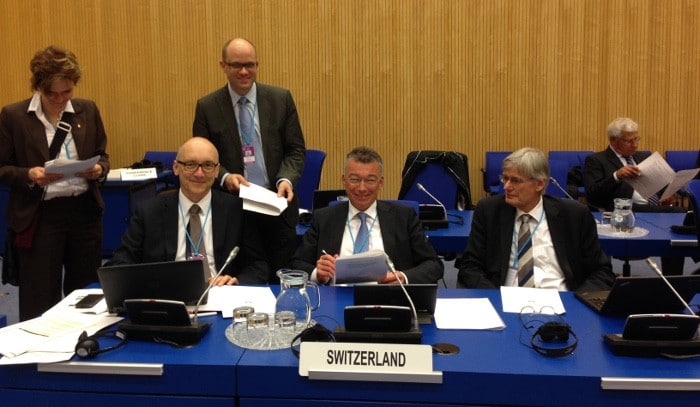Participation in the Swiss Sectoral Plan for Deep Geological Repositories is internationally recognised as exemplary

International experts at the IAEA conference in Vienna have singled out Switzerland’s approach to the search for a location for a deep geological repository as exemplary. In their assessment of the Swiss National Report in connection with the Joint Convention, they also identified several challenges: the review of the 2×2 proposal, the waste management programme and the decommissioning concept for the Mühleberg nuclear power plant.
Switzerland was awarded two “Good Practices” during the fifth Review Meeting of the Joint Convention on the Safety of Spent Fuel Management and on the Safety of Radioactive Waste Management. Among various aspects that were mentioned, the model for participation in the sectoral plan procedure for deep geological repositories was described as “exemplary”. It was stated that opportunities for participation in this procedure (which is managed by the Swiss Federal Office of Energy (SFOE)) are extensive, and are made available on a systematic basis. Another feature that was welcomed is that populations in neighbouring countries are involved to the same extent as the Swiss public.
Experts from the Contracting Parties to the Convention consider that several review tasks in the period until the next Review Meeting in 2018 pose challenges for Switzerland. In particular, these include the review of the 2×2 proposal which Nagra (the National Cooperative for the Disposal of Radioactive Waste) submitted at the end of 2014, and the review of the waste management programme that Nagra must submit in 2016.
Decommissioning of the Mühleberg nuclear power plant presents a challenge
The issues raised also included the decommissioning of the Mühleberg nuclear power plant after it is taken out of service in 2019. On the one hand, the international experts lauded the preliminary work accomplished since the last meeting in 2012, in particular by the Swiss Federal Nuclear Safety Inspectorate (ENSI). This included the development of expertise within the supervisory authority as well as the drafting of guideline ENSI-G17 on decommissioning. On the other hand, the experts consider that the review of the decommissioning concept which BKW intends to submit at the end of 2015 presents a challenge.
Self-reflection on supervisory culture is a “Good Practice”
The experts also discussed ENSI’s supervisory culture project, for which they awarded another “Good Practice”. In the course of this extensive project over the last three years, ENSI has critically examined its own work and the impact of its activities as a supervisory authority, and has developed a tailor-made package of measures.
ENSI’s Director General Hans Wanner gave a positive summary after the Review Meeting in Vienna: “International Review Meetings of this sort are valuable for Switzerland because they allow us to compare our work to that of other countries and to identify areas where our own work needs to be improved.”

